

KEY STAGE 3


CURRICULUM INTENT
Our curriculum is guided by our core principles of excellence, care and high expectations. This means we hold dear the belief that every single young person at our school is capable of achieving something extraordinary
Excellence is embodied in our curriculum through the high value we place on subjects and our teachers as experts in their subject areas. We want pupils to have access to the best that has been thought and said. Therefore, our teachers think in detail about what to teach and in what order. We want pupils’ future options to be wide, so we ensure our curriculum is broad and balanced.
Care is demonstrated through our evidence informed approach to planning and teaching We believe pupils are more likely to remember all they have learned if the delivery of that knowledge has been carefully sequenced and matched to appropriate teaching strategies. Our ethos, underpinned by the gospel values, respects each pupil as unique individuals. All adults within the school foster close and productive relationships with pupils so showing them a blueprint for how they can engage positively with their wider community.
High expectations are evident through the rigorous, academic and vocational curriculums on offer. At GCSE, the vast majority are entered for, and excel in, Ebacc subjects. By ensuring broad coverage of academic and vocational subjects, we ensure all pupils are not only prepared for public exams but life afterwards.
Our curriculums are planned backwards from the end of each Key Stage but enriched from the level above. This is to ensure that our curriculum offer is ambitious for all students We design it so that a pupil will excel at university or acquire the subject knowledge and skills for a future career, whatever the route they take. We want pupils to leave the school with the widest possible life choices so they are able to find their place as active, educated citizens within society.
CURRICULUM OVERVIEW
We believe in giving our students a rich and broad curriculum across the key stages. The table below gives an overview of the curriculum in year 7, 8 and 9.
Year 7
English
Year 8
Year 9
CURRICULUM STRUCTURE
The graphics below indicate how many hours students get for each subject in year 7, 8 and 9
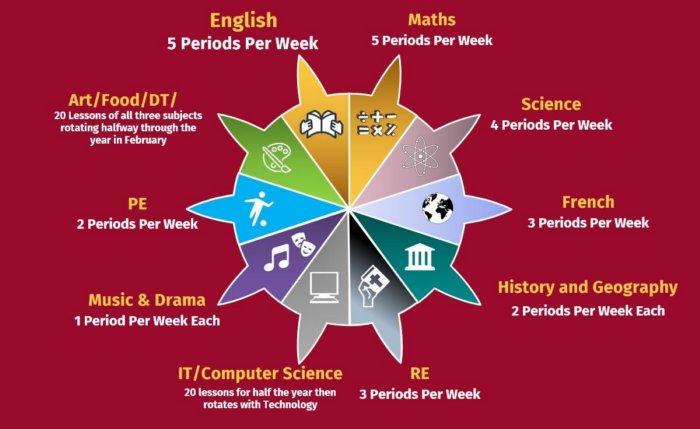
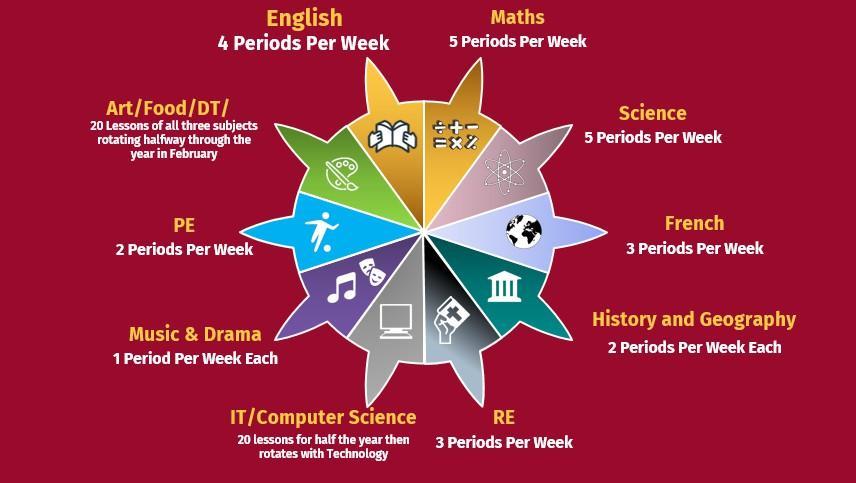
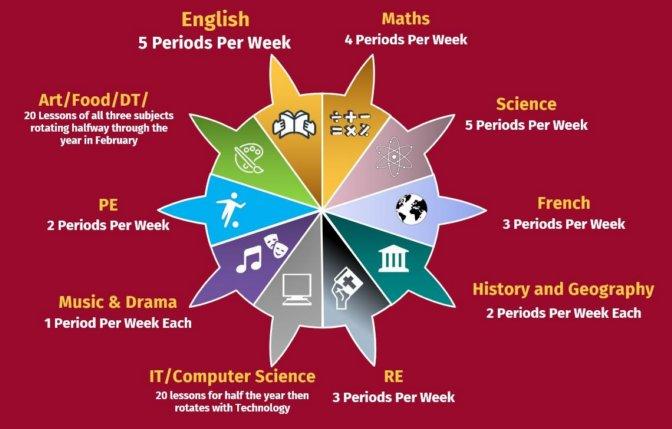
YEAR 9 OPTIONS
At the end of year 9 all students will choose the subjects they want to study at GCSE. You will receive a lot more information in year 9 but this is a brief overview.
There are two routes students can take when choosing their GCSE subjects The Green route and the Blue route
The Green route is the more academic route where students will carry on studying a Humanity, Language and choose one other subject. Choosing some of these would provide a solid foundation for progression to study A Levels and continued education at university.
The Blue route provides students with a mix of academic and vocational subjects, which is ideal for those students who wish to undertake studies which provide a good preparation for the world of work, and/or future post-16 vocational studies and A Levels.
The option blocks are as follows and students will be able to choose one subject from each block.:
FUTURE ROUTES
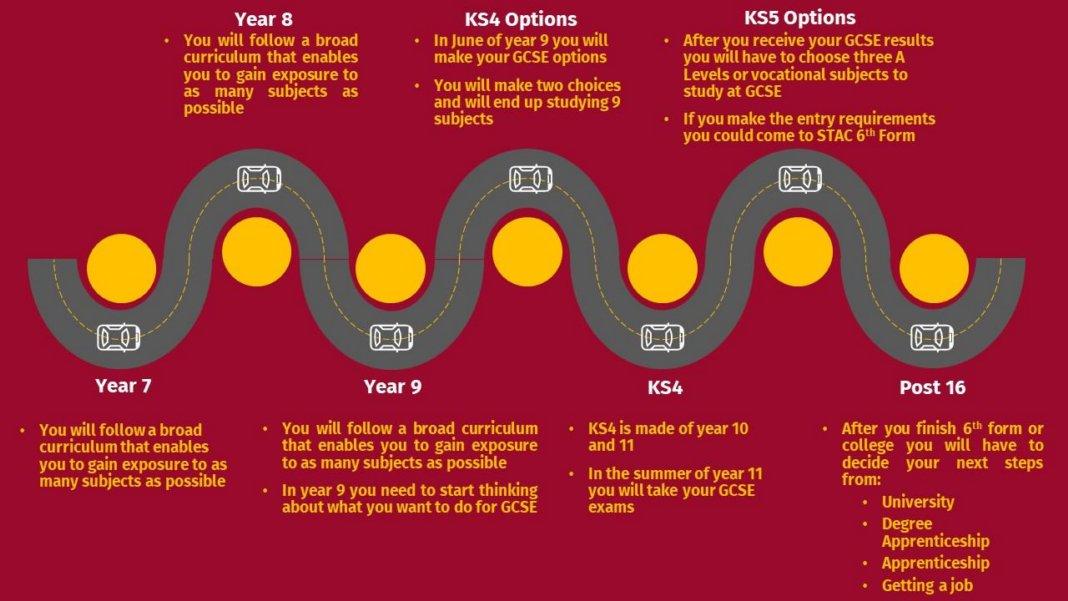
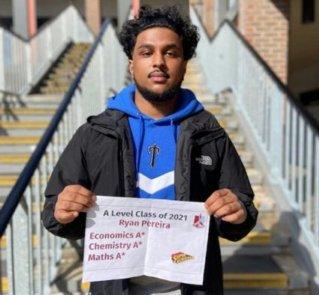

Although this curriculum guide is about the KS3 curriculum, it is important that students and parents understand where the subjects can lead to. Below is a brief guide to what might lie ahead for your son. University

Year 7
EN
WH Autumn
Voices and Viewpoints
• Narrative voice
• Short story writing
• Analysing texts
• Comparing viewpoints
My Name is Leon
• Whole text analysis
• Tracking a theme or character through a text
• Essay writing skills
Tone in Non-Fiction
•Analysing tone and writer’s perspective
•Non-fiction writing
•Analysing current affairs and issues
•Accessing a range of nonfiction forms (speech, letter and article)
Year 8
Animal Farm
• Analysis of whole text
• Analysing text alongside contextual information
• Essay writing skills
GLIS
AT WILL I LEAR
Spring
Forms of Poetry
• History of poetry
• Understanding of the different forms
• Poetic techniques
Our Day Out
• Conventions of a play
• Portrayal of a character throughout a play
• Linking play to it’s context
• Authorial intention
War Poetry
• Tracking the portrayal of war throughout WW1
• Analysing poetry
• Writing poetry
• Considering literary context
N?
Summer
Dystopian Fiction
• Understanding genre
• Looking at how it links to context
• Analysis of dystopian text
• Writing dystopian text
Frankenstein
• Analysis of whole text
• Analysing text alongside contextual information
• Essay writing skills
19th Century Extracts
• Tackling harder texts
• Improving analysis
• Writing in specific genre
Romeo and Juliet
• Applying contextual information
• Approaching Shakespearean texts
• Analysing character arcs across a narrative
Genres
• Approaches to questions akin to those in the GCSE Language Paper 1
• Analytical skills
• Creative Writing skills
Year 9 Great Expectations
• Analysing text in context
• Building contextual knowledge for further study
• Authorial intention
Hamlet
• Understanding conventions of tragedy
• Building contextual knowledge for further study
• Evaluating performance
• Approaching Shakespearean texts
Lord of the Flies
• Analysing text in context
• Approaching challenging themes in texts
• Writing GCSE style essays
• Authorial intention
Leave Taking
•Conventions of a modern play
•Consideration of literary context
•Portrayal of a theme throughout a play
•Authorial intention
•Analysis of theatrical form
Identity Poetry
• Recap poetic techniques
• Recap analysing poems
• Comparison of poems
Non-Fiction: Global Issues
• Revise non-fiction texts
• Develop speaking and listening skills
• Approaches to questions akin to those in the GCSE Language Paper 2
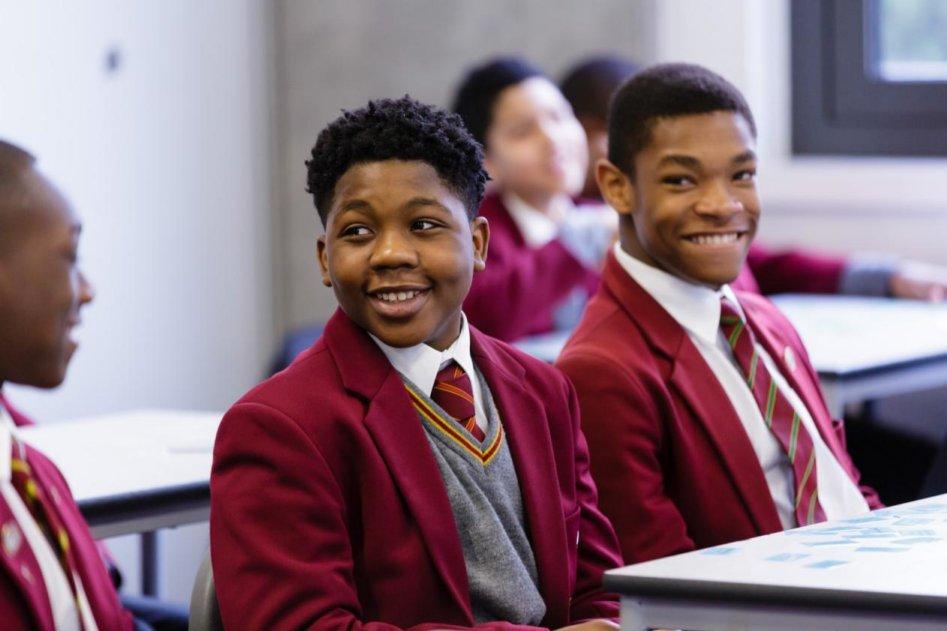
EXTRA CURRICULAR OPPORTUNITIES & OTHER INFORMATION
Debate Mate
TOP TIPS TO ENHANCE LEARNING
Reading at home; this will see your writing and reading skills improve
Going above and beyond in your Bedrock homework
Completing homework to a high standard
Using the mark schemes to push your answers to the next level
WHAT COURSES DOES THIS LEAD TO?
KS4:
AQA English Language
AQA English Literature
KS5:
English Literature A Level
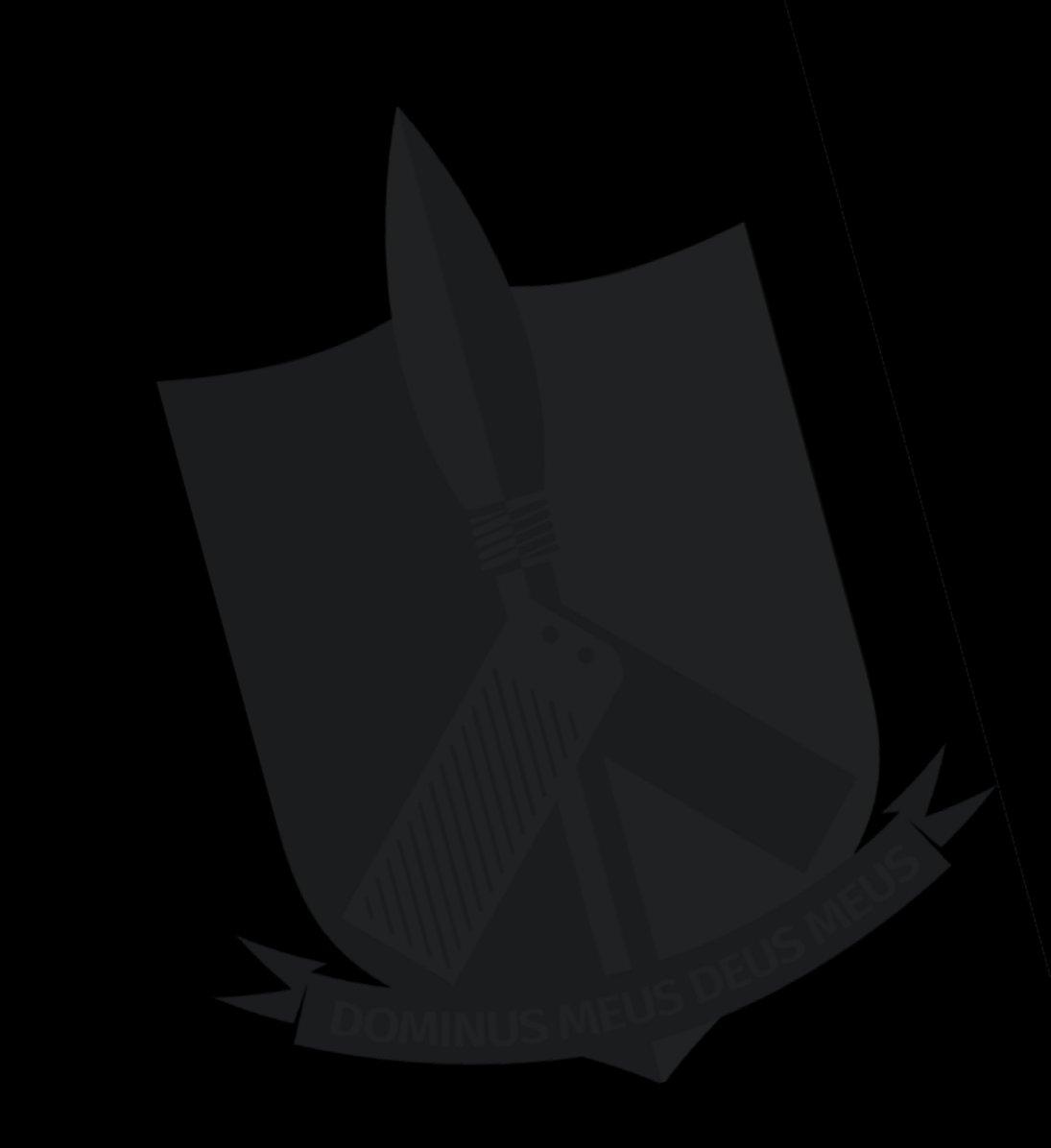
9
MATHS
WHAT WILL I LEARN?
• Fractions, decimals, percentages
• Negative numbers
• Rounding
• Factorising
• Substitution
• Collect Like terms
• Form expressions
• Solve equations
• Area and perimeter
• Compound shapes
• Averages
• Graphs and charts
• Proportion
• Ratios
• Fractions, FDP conversion
• Indices, Powers, Roots
• Sequences
• Angle rules
• Constructions an loci
• Probability
• Fractions, Decimals, Percentages
• Percentages
• Factorisation
• Expanding brackets
• Substitution
• Equations
• Area and perimeter of compound shapes
• Volume and surface area
• Surds
• Plotting graphs
• Equation of parallel and perpendicular graphs
• Sequences
• Constructions and loci
• Angle rules
• Congruence and similarity
• Pythagoras
• Averages
• Box plots, histograms
• Simultaneous equations
• Change the subject of a formula
• Factorising
• Circle, area and circumference and sectors and arcs
• Volume and surface area
• Reverse percentages
• Proportion
• Angle, in polygons, in parallel lines
• Co-ordinates
• BIDMAS
• Standard form
• Calculator use
• LCM and HCF
• Equation of a straight line
• Coordinates
• Percentages
• Two-way tables
• Pie Charts
• Questionnaires
• Sampling
• LCM and HCF
• Unit conversion
• Simultaneous equations
• Equation of a line
• Similarity
• Transformations
• Ratio
• Proportion
• Factorisation
• Rearranging equations
• Averages from frequency tables
• Indices including negative/ fractional
• Error intervals
• Pythagoras
• Trigonometry
• Bearings
• Standard form
• Surds
• Bounds
• Product rule for counting
• Indices laws
• Inequalities
• Algebraic fractions
• Simultaneous equations
• Inverse functions
• Probability trees
• Expected probability
• Experimental probability
• Venn diagrams
• Ratio
• Substitution
• Linear sequences
• Plans and Elevations
• Constructions
• Transformations
• Frequency polygons
• Sample space diagrams
• Drawing straight line graphs
• Gradients
• Compound measures
• Money matters
• Problem Solving
• Using ‘Excel’
• Product rule for counting
• Probability trees
• Percentage of amount
• Reverse Percentages
• Equation of a line
• Solving equations including simultaneous equations
• Drawing quadratics
• Distant/Time Graphs
• Frequency Tables including grouped data
• Histograms
• Box Plots
• Cumulative Frequency
• HCF and LCM
• Trigonometry
• Fractions, decimals and percentages
• Vectors
• Surds
• Standard form
• Sequences
• Expanding brackets
• Solving equations, including quadratic
• Completing the square
• Trigonometry
• Bearings
• Scale drawings
• Metric conversions
• Transformations
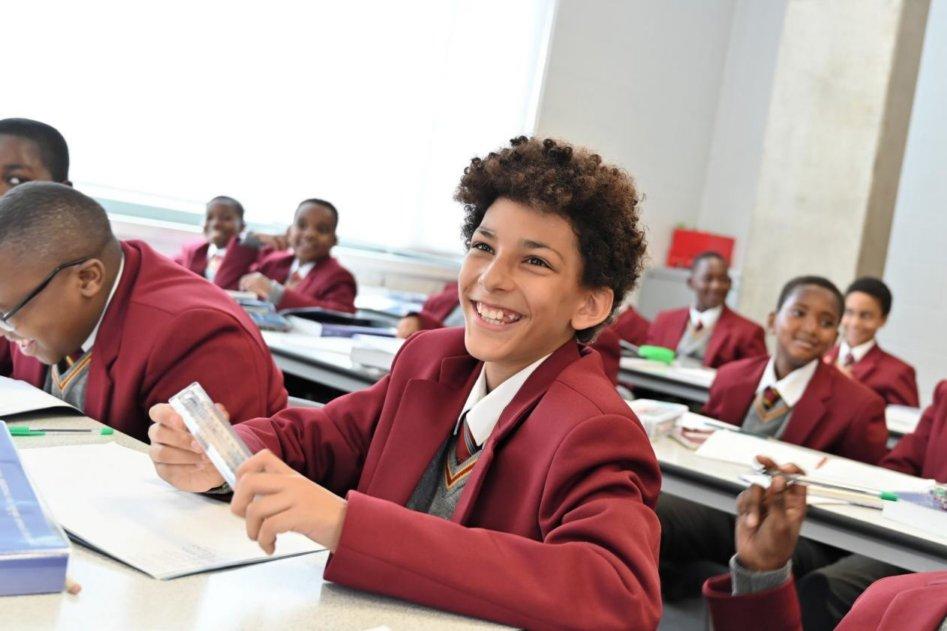
EXTRA CURRICULAR OPPORTUNITIES & OTHER INFORMATION
Puzzle of the Week
Sparx Help Clinic (Tuesday Lunch)
TOP TIPS TO ENHANCE LEARNING
Sparx independent learning for KS3
Times table rock stars to improve numeracy
Year 7 lessons on how to use Excel and money matters
WHAT COURSES DOES THIS LEAD TO?
KS4
GCSE Mathematics and Further GCSE Mathematics
KS5:
A level Mathematics and A level Further Mathematics
Higher Education and Industries that require Mathematics: Actuarial Science, Aeronautical Engineering, Chemical Engineering, Civil Engineering, Economics, Electrical/Electronic Engineering, Engineering (General)

Year 7
SCIENCE WHAT WILL I LEARN?
Autumn Spring Summer
Science Skills
• Lab safety
• Displaying and Analysing results
• Units and Conversions
Biology Block 1
• Microscopes and cells
• Cell differentiation
• Diffusion and Osmosis
Biology Block 2
• Organ systems
• Digestive system
• Heart and blood
• Skeleton and muscles
• Respiration
Chemistry Block 2
• Particle Model
• States of Matter
Biology Block 4
• Viruses and Bacteria
• Immune system
• Antibiotics and Vaccinations
Chemistry Block 3
• Combustion
• Thermal decomposition
• Conservation of mass
• Endo/Exothermic reactions
Chemistry Block 1
• Atoms / compounds and mixtures
• Chemical Formulas
• Periodic Table
Physics Block 1
• Forces, Friction
• Hooke’s Law
• Speed and Acceleration
Physics Block 2
• Waves
• Light
• Sound
• Space
Biology Block 3
• Puberty and reproduction
• Foetal development
• Plant reproduction
Chemistry Block 4
• Acids and Alkalis
• Neutralisation
• Making Salts
Physics Block 3
• Energy Transfer
• Burning fuels
• Fossil fuels
• Renewable energy
Science Skills
• Lab safety
• Displaying and Analysing results
Year 8
• Units and Conversions
Chemistry Block
• Acids and Metals
• Metals and Oxygen/Water
• Displacement reactions
• Extracting metals
• Polymers
Biology Block 1
• Competition
• Adaptations
• DNA, Variation and Evolution / Extinction
Physics Block 2
• Energy transfers
• Power
• Radiation
Physics Block 3
• Potential Difference
• Circuits
• Resistance
• Magnets
• Electromagnets
Biology Revision Block 1
• Cells
• Magnification
• Osmosis
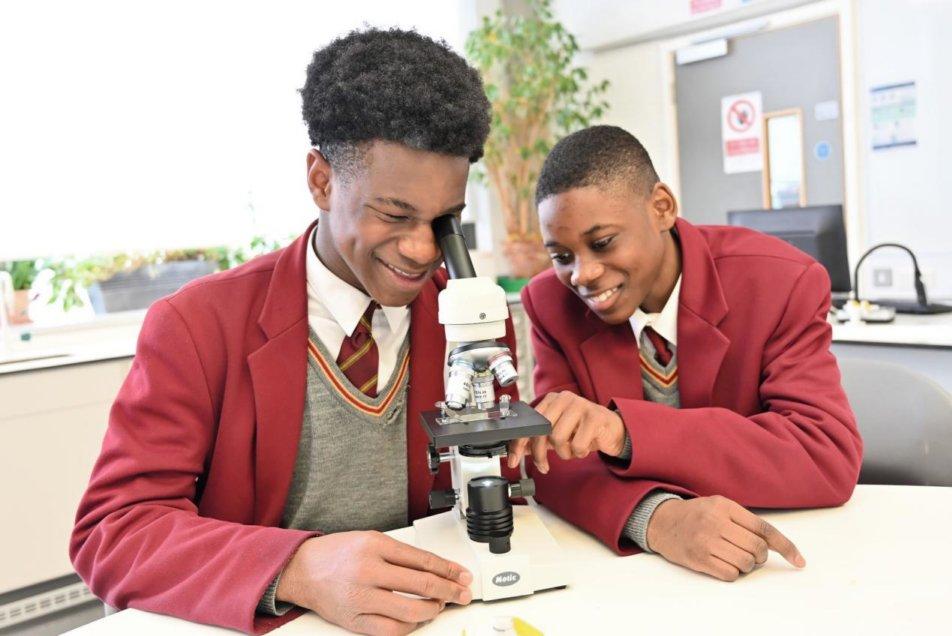
EXTRA CURRICULAR OPPORTUNITIES & OTHER INFORMATION
Science Club provides opportunities for students to take part in more practical activities and also participate in special national awards and project work linked to STEM subjects.
TOP TIPS TO ENHANCE LEARNING
Use YouTube to watch revision videos
Refer to CGP Study guide to take Revision notes (copy out, label and explain diagrams adding colour can be particularly useful!)
WHAT COURSES DOES THIS LEAD TO?
KS4: Combined Science
Separate Science GCSEs
KS5:
KS5 A Level Science (Biology/Chemistry/Physics)
BTEC Applied Science
SCIENCE
Autumn Spring Summer
Chemistry Block 1
•Atoms / elements and compounds
•Electronic structure
•Metals and non-metals
•Group 1, 7 and 0
Physics Block 1
•Speed and Motion
•Pressure (liquids/gasses)
Year 8
•Turning Forces
•Energy and Power
Biology Block 2
•Photosynthesis
•Respiration
•Food chains and Webs
•Ecosystems
•Abundance
•Carbon Cycle
Biology Block 1
• Cell Structures, Microscopes
• Cell division
• Transport with cells
Year 9
Chemistry Block 1
• Earth’s Early Atmosphere
• Greenhouse gases
• Pollutants
• Using the Earth’s resources
• Water
Physics Block 1
• Energy stores and systems
• Specific Heat Capacity
• Efficiency
• Energy resources
Biology Block 3
• Food and Digestion
• Diet
• Enzymes
• Bacteria
• Drugs / smoking
•Homeostasis and Nervous system
Chemistry Block 3
• Mixtures, solutions
• Solubility & filtration
• Evaporation and distillation
• Chromatography
Biology Block 2
• The digestive system
• Enzymes
• Blood and the Heart
• Breathing and gas exchange
• Plant tissues and organs
Chemistry Block 2
• Atomic structure
• Development of the atom
• Development of the periodic table
• Group 1, 7 and 0
Physics Block 2
• Circuits
• Circuit symbols
• Parallel and Series
• Power
• Mains electricity and the national grid
Chemistry Block 3
• Earths Early Atmosphere
• Greenhouse gases
• Pollutions from fuels
• Deforestation
• Biodiversity
• Human Population Explosion
Physics Revision Block 1
• Energy stores and systems
• Wasted energy
• Gravitational potential energy
• Work done / Power
• Energy efficiency
Biology Block 3
• Virus and Bacteria disease
• Immune system
• Vaccination, antibiotics, pain killers
• Drug development
• Cancer
• Smoking, alcohol and Diet
Chemistry Block 3
• Bonding
• Ionic bonds
• Covalent bonds
• Allotropes of carbon
• Metallic bonds
• Properties according to bonding and structure
• Polymers
Physics Block 3
• Density
• Internal energy
• Latent heat
• Radiation

EXTRA CURRICULAR OPPORTUNITIES & OTHER INFORMATION
Science Club provides opportunities for students to take part in more practical activities and also participate in special national awards and project work linked to STEM subjects.
TOP TIPS TO ENHANCE LEARNING
Use YouTube to watch revision videos
Refer to CGP Study guide to take Revision notes (copy out, label and explain diagrams adding colour can be particularly useful!)
WHAT COURSES DOES THIS LEAD TO?
KS4:
Combined Science
Separate Science GCSEs
KS5:
KS5 A Level Science (Biology/Chemistry/Physics)
BTEC Applied Science
RE WHAT WILL I LEARN?
Autumn Spring
• The natures of God
• Creation
7
Summer
— God is Revealed Creation and Covenant Revelation
• Catholic Social Teachings
• Environmental ethics
Prophecy and Promise—The Word of God
• What is the Bible?
• The Magisterium and Tradition.
• How is scripture used
Creation and Covenant— God’s relationship with humanity
• Imago Dei and the Fall
• Covenant with Moses
• Conscience
• Baptism
Prophecy and Promise Redemption
• What are prophecies?
• Messianic Prophecies
• Advent
• How is Advent celebrated today?
Galilee to Jerusalem Revelation of Jesus
• The Incarnation
• Titles for Jesus
• The Trinity
• Living out the teachings of Jesus
Desert to Garden—The Sacraments
• The Sacraments
• The Paschal Mystery
• The Eucharist
• Divergent Christian worship
Galilee to Jerusalem—The Kingdom of God
• The Kingdom of God
• How should Christians treat others?
• Miracles
• Anointing of the sick
Desert to Garden The meaning of suffering
• The Problem of Evil and Suffering
• Suffering in the Bible
• Euthanasia
• The Tridium
To the Ends of the Earth The Holy Spirit
• The Holy Spirit
• Pentecost
• Sacrament of confirmation
• Charismatic Movement
Judaism
• History of Judaism
• Practises
• Festivals
• The Holocaust and AntiSemitism
To the Ends of the Earth— Eschatology
• Catholic beleifs about life after death
• Funerals
• Divergent views on life after death
• Reconciliation Islam
• The Five Pillars of Islam.
• Beliefs about life after death.
• Ethics in Islam.
Parents/carers have the right to withdraw their child, wholly or partly from:
• Receiving religious education (RE) given in the school in accordance with the school’s basic curriculum
• Attendance at religious worship in the school
You are not obliged to give a reason for requesting the withdrawal. However before exercising any right of withdrawal we would recommend you discuss your concerns with the Head teacher here at STAC
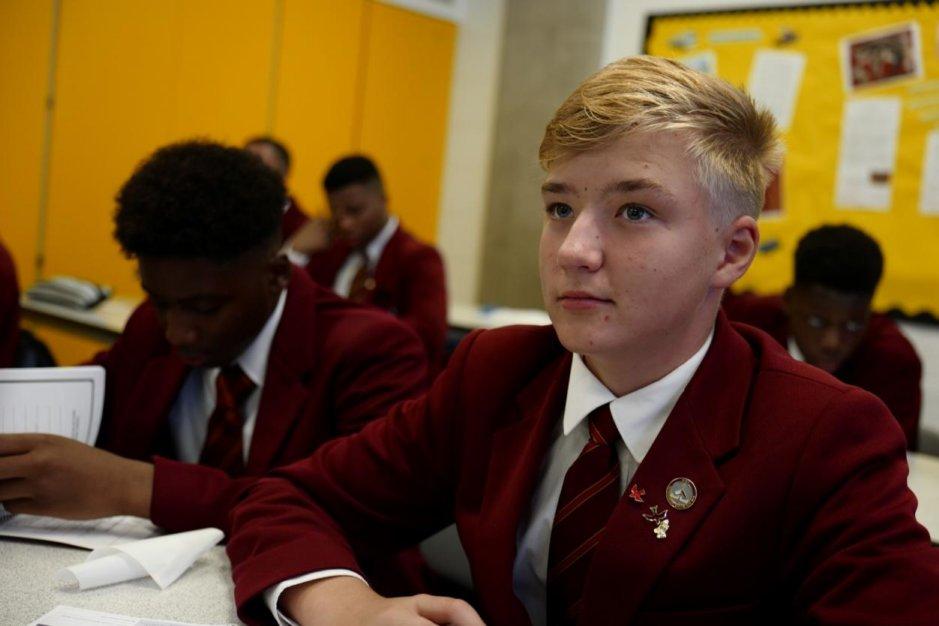
EXTRA CURRICULAR OPPORTUNITIES & OTHER INFORMATION
Philosophy Club is run at lunchtimes, this gives pupils the chance to explore and deepen their beliefs whilst considering difficult philosophical questions
TOP TIPS TO ENHANCE LEARNING
Learning key vocabulary is essential, pupils are given a knowledge organiser for each topic
Using BBC Bitesize there are a great range of texts, videos and quizzes to help your learning
WHAT COURSES DOES THIS LEAD TO?
KS4:
GCSE in Religious Education
KS5:
Philosophy and Ethics A-Level
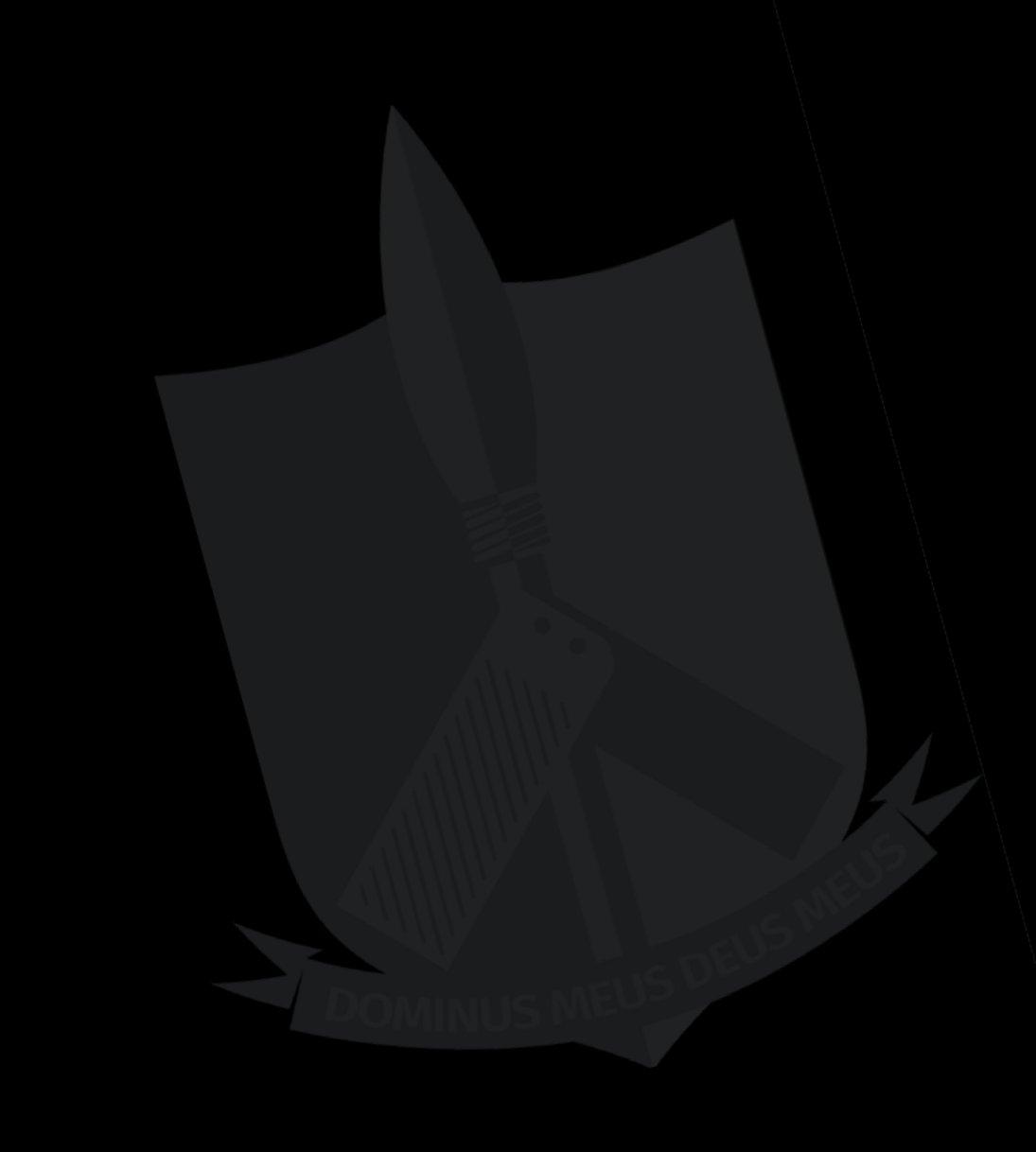
Year 7
Year 8
Year 9
ART
WHAT WILL I LEARN?
The Formal Elements of Art & Colour Theory
• Use and apply the formal elements to a piece of art.
• Analyse works of art.
• Apply a range of materials, techniques and processes.
• Create imaginative outcomes utilising the formal elements
• Knowledge and understanding of colour theory in art.
• Analyse works of art.
• Mixing and blending colours in paint and pencil.
• Knowledge of key art movements utilising the use of colour and its application.
Coral Reef Pinch Pots (clay project)
• Manipulate 3D materials (clay) in order to build a pinch pot inspired by coral reefs.
• Analyse works of art.
• Knowledge of key artists who explore clay and natural form themes.
• Experiment and manipulate materials, specifically clay.
• Designing sculpture plans and experiments for clay.
Surrealist Portraiture
• The surrealist art movement and artists who create surreal portraits.
• Draw an accurate self-portrait from life.
• Distort or morph facial features.
• Mix and blend accurate skin tones in colour pencil.
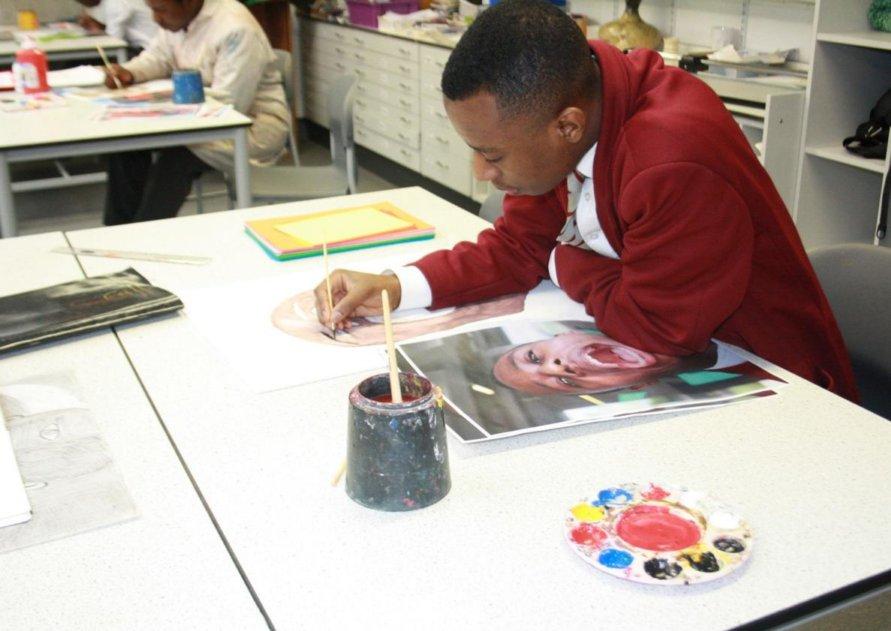
EXTRA CURRICULAR OPPORTUNITIES & OTHER INFORMATION
Art clubs and Workshops
Gallery and Museum visits
Art and Design Competitions
TOP TIPS TO ENHANCE LEARNING
YouTube A variety of art visual language skill based formal element techniques to build and practice the methods and techniques used with art materials.
Practice and experiment with a range of art techniques, tools and materials, outside of the classroom.
Don’t give up when your visual outcomes are not the way you intended, imagination and creativity can be explored through feeling, mood and an emotional response using and applying techniques and methods creating personal outcomes.
WHAT COURSES DOES THIS LEAD TO?
KS4:
GCSE Art and Design
KS5:
A level 3D Design

DRAMA
WHAT WILL I LEARN?
Characterisation (1) - Roald Dahl characters and stories
• Developing performance skills
• Rehearsing, refining and
Commedia dell Arte—Developing character and Improvisation skills
• Stock characters
• Mask work
Technical Theatre (2) – Lighting and sound
• Working from a script
• Creating LFX and SFX designs for key scenes
Playing Shakespeare
• Textual analysis
• Developing characters
Devising (1) - Developing skills and techniques
• Responding to a stimulus
• Creating and refining an original piece of performance
Physical Theatre
• Developing Physical Theatre performance skills
• Responding to a stimulus
• Gecko and Frantic Assembly
Duologues (LAMDA Exams)
• Textual analysis: Super Objectives, objectives and units of action
• Performance of a scene
Characterisation (2) - Blood Brothers
• Developing characters
• Performance of two key extracts from text
Movement, Mask and the Actor (Trestle)
• Mask work
• Creating and refining an original piece of performance
Devising (2) - Using practitioners (Brecht)
• Brechtian techniques
• Brechtian performance
Technical Theatre (1) - Costume and Set Design
• Working from a script
• Creating artistic designs for set
Live Theatre Appreciation (1)
• Watching live performances
• Developing analytical and evaluative skills
• Practical exploration of text
Text in Performance (1)
• Practical exploration of a text –POV performer and director
• Technical theatre design – SFX, LFX, Costume and set design
• Practical realisation of key extracts from text
Spontaneous Improvisation
• Accepting and building ideas
• Developing characters
• Improvisation challenge
Text in Performance (2)
• Practical exploration of a GCSE set text – POV performer and director
• Technical theatre design –SFX, LFX, Costume and set design
• Practical realisation of key extracts from text
Technical Theatre (3) - Lighting, sound, set and costume
• Technical theatre design – SFX, LFX, Costume and set design
Monologues (LAMDA Exams)
• Textual analysis: Super Objectives,
• objectives and units of action
• Solo performance

EXTRA CURRICULAR OPPORTUNITIES & OTHER INFORMATION
Annual musical theatre performance, past performances: Lion King, Jungle Book, We Will Rock You, Bugsy Malone, Little Shop of Horrors (March 2022), Sweeney Todd (2023), The Wiz (2024)
Key Stage Three Drama Club and summer Shakespeare productions, past performances: Henry V, Midsummer Night’s Dream, The Tempest, Romeo and Juliet
Shakespeare’s Globe – Our Theatre, Curtain Raiser and Southwark Youth Theatre
TOP TIPS TO ENHANCE LEARNING
Join a local youth theatre group at Theatre Peckham, Southwark Playhouse, Blue Elephant and Mountview
Watch a production at a local theatre and write a review: National Theatre, Old Vic, Young Vic, Southwark Playhouse, Unicorn Theatre
Watch Performances Drama Online Library
BBC Bitesize Drama https://www.bbc.co.uk/bitesize/subjects/zk6pyrd
Oak National KS3 Drama units https://classroom.thenational.academy/subjects-by-key-stage/ key-stage-3/subjects/drama
WHAT COURSES DOES THIS LEAD TO?
KS4:
GCSE Drama – Edexcel Exam board
Vocational Drama – WJEC Exam board
• KS5:
A Level Drama – Edexcel Exam board
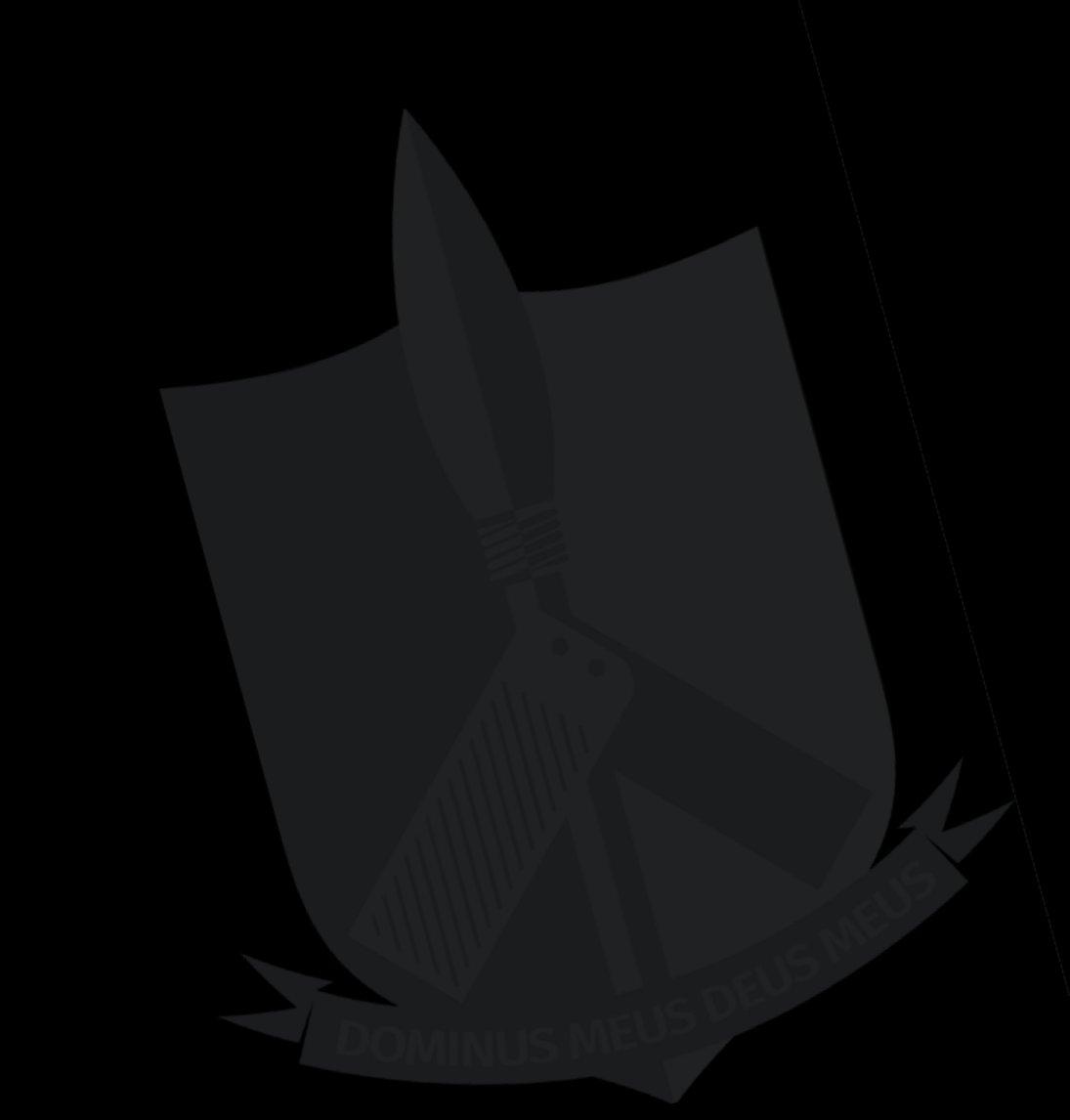
7
FOOD TECHNOLOGY
WHAT WILL I LEARN?
Healthy Eating, Kitchen Hygiene and Basic Skills
• Food safety and hygiene
• Healthy eating and the Eatwell Guide
• Basic cooking skills
• Knife safety
• Evaluation of the recipe
• Technical and subject specific vocabulary
Cooking Skills and Evaluation
• Food safety and hygiene
• Development of cooking skills
• Technical and subject specific vocabulary
• Evaluation of the recipe using star analysis
8
Food from Around the World – Cultural Influences
• Knowing where in the world food comes from
• Making dishes from countries from around the world
• Ingredients specific to certain counties
• How culture has impacted the variety of foods offered in the UK
Cooking Skills and Evaluation
• Food safety and hygiene
• Development of cooking skills
• Using various equipment
• Development technical and subject specific vocabulary
• Development of evaluation of the recipe using star analysis
Event cooking
• Cooking food specific for events
• Batch cooking foods
• Making food all the same shape and size
• Making the food produced look appetising and a high standard
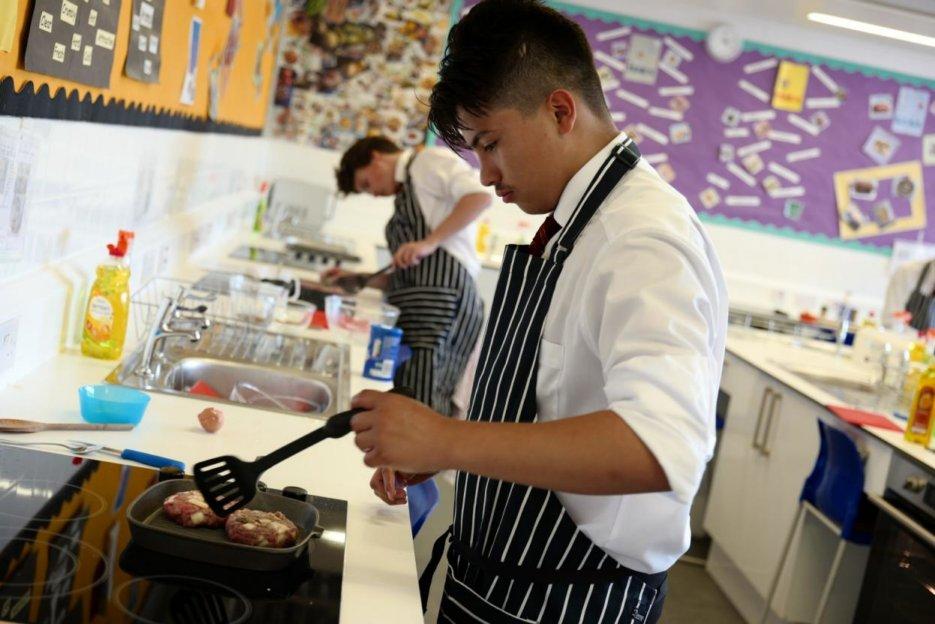
EXTRA CURRICULAR OPPORTUNITIES & OTHER INFORMATION
Cooking clubs
Cooking competitions
Workshops and external visits
TOP TIPS TO ENHANCE LEARNING
Food a fact of life an excellent website to enhance the student’s knowledge in ingredients, cookery skills, processes, equipment, health and safety.
Reading, finding recipes, using such books as:
Nadiya Hussain’s Bake Me a Story, Children’s First Cookbook, Cooking Step By Step
Websites: BBC Good Food, Cooking with Kids
WHAT COURSES DOES THIS LEAD TO?
KS4:
GCSE Food & Nutrition
KS5:
At college: Hospitality and catering courses, A’ Level Food and Nutrition and A’ Level Food Technology A Level Food Tech

WHAT WILL I LEARN?
How are world cities changing?
• World cities and megacities
• Distribution of world population
• UK population distribution
• Growth of London
• Challenges and opportunities in London
• Study of Peckham
Why are some countries more developed than others?
• What is the global distribution of wealth?
• What is development?
• Why is there a development gap?
• What are the consequences of uneven development?
• How can the development gap be closed?
Should we preserve Antarctica?
• Physical geography of Antarctica
• Climate graphs of Antarctica
• Scientific research, tourism, mineral extraction, whaling and fishing in Antarctica
• Climate change in Antarctica
• Antarctic Treaty
How diverse are biomes?
• Location and characteristics of biomes
• Interrelationship between abiotic and biotic features
• Food webs and food chains
• Animal and plant adaptations
• Nutrient cycle
• Case studies about marine, temperate deciduous forest and savannah biomes
• Tourism in the Maasai Mara
What is the physical geography of the UK?
• Uplands & lowlands
• Glacial landscapes
• Fluvial landscapes
• Coastal landscapes
Why are some natural hazards deadlier than others?
• Natural hazards
• Hazard risk
• Plate boundaries
• Impacts and responses of earthquakes and volcanic eruptions
• Causes and impacts of tsunamis
• Reducing risk
• Multi-hazardous zones
How and why is globalisation changing the world?
• Measuring globalisation
• Factors that affect globalisation
• Demographic Transition Model
• Manufacturing in China
• Impacts of Chinese investment in Africa
• Transnational corporations
• Tourism and globalisation
What is resource management and why is it so important?
• Water surplus and deficit and reasons for uneven distribution
• Impacts of water insecurity
• Sustainable water solutions
• Food surplus and deficit and reasons for uneven distribution
• Impacts of food insecurity
• Sustainable food solutions
What are superpowers and how have they changed over time?
• What is a superpower?
• Why did the UK empire collapse?
• Emerging superpowers
• Global fashion industry
• IGOs
• Russia in the Arctic
• The American dream?
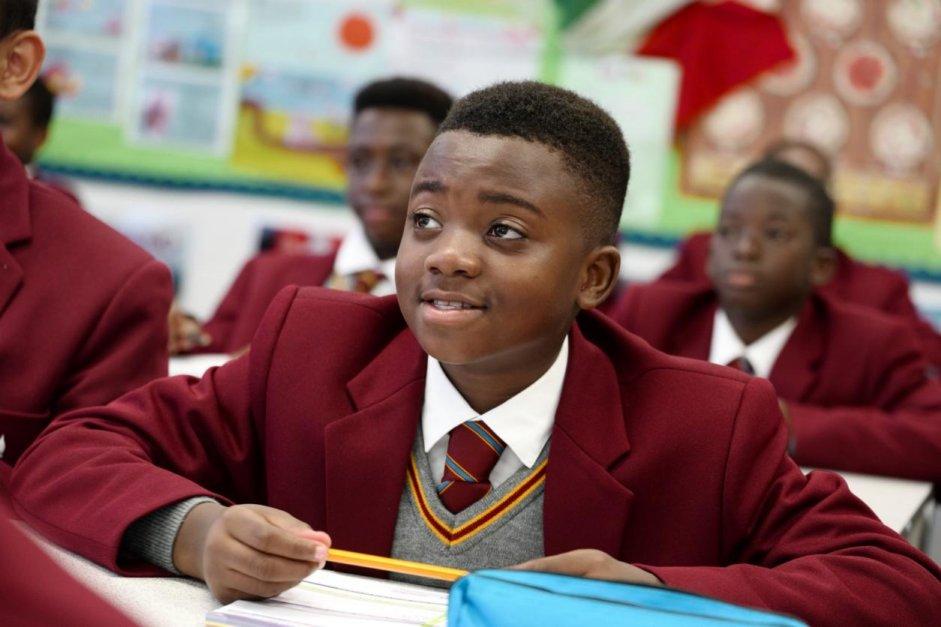
EXTRA CURRICULAR OPPORTUNITIES & OTHER INFORMATION
Share and discuss ideas/experiences related to geography in a safe and friendly environment
Develop a curiosity and interest in our wider world
Build a clearer understanding of geographical skills through games and activities
Identify local solutions to global sustainable issues
Develop and maintain the school’s sustainable allotment
TOP TIPS TO ENHANCE LEARNING
Microsoft Teams quizzes
Revision activities from the start of lessons
Seneca learning
WHAT COURSES DOES THIS LEAD TO?
KS4:
GCSE Geography
KS5:
A Level Geography


HISTORY WHAT WILL I LEARN?
Topic one: Normans
• How did the French Duke become the King of England?
Topic one: The Black Death
• Did the Black Death improve life in Europe?
Topic two: Medieval England
• Was it really so Measly
Topic two: Reformation
• Was the Reformation just like a roller coaster?
Topic one: Power and the People
• How has Oliver Cromwell’s reputation changed over time?
Topic two: Tutor and Stuart Exploration
• Why did England start to expand in the c16th and 17th?
Topic one: Discovering the Americas
• How did the Conquistadors change the world forever?
Topic two: Slavery and Abolition
• How far did William Wilberforce contribute to the abolition of slavery?
Topic one: WWI
• What do sources reveal about the experience of soldiers during World War One?
Topic two: The Inter-War Years
• Was WWII inevitable?
Topic one: Empire
• How should the British Empire be remembered?
Topic two: Industrial Revolution
• How far did ordinary lives change in the industrial Revolution?
Topic one: WWII Turning Points
• Did the USA win WWII?
Topic two: Nazi Germany and the Holocaust
• How was the Holocaust allowed to happen?
Topic one: UK Civil Rights
• What were the Suffrage campaigners fighting for?
Topic two: UK Civil Rights
• How have Black Civil Rights changed over time?
Topic one: USA
• How was the USA affected by the Great Depression between 1929 and 1945?
Topic two: USA
• How had the economy of the USA changed by the 1960s?

EXTRA CURRICULAR OPPORTUNITIES & OTHER INFORMATION
KS3 Trip to Edinburgh
TOP TIPS TO ENHANCE LEARNING
Spaced, repetitive revision using flash cards
Revision activities using your knowledge organiser to support you
BBC Bitesize has a number of websites on the topics we cover for
KS4:
GCSE History
KS5:
A Level History
A Level Politics

IT AND COMPUTER SCIENCE
WHAT WILL I LEARN?
KS3 students have one 18 week block in Computer Science per year.
Topic 1
E Safety and use of a computer
• Using Email;
• Word processing; and Presentation software.
• Cyberbullying
7
8
• Staying safe online
• Phishing
• Social Media
Computer Systems
• Input and Output Devices
• Types of Computer Systems
• Main Memory
• The CPU
• Storage Units
Topic 2
Block based programming
• Algorithms
• Top-down design; Sequences;
• Selection; and Iteration.
• Secondary Storage Networks
Data representation and logic circuits
• Binary
• Addition
• Multiplication
• Division
• Sound
• Images
• Logic gates - AND, OR, NOT
• Truth tables
• The Internet and W.W.W.
• Packets
• Network Hardware
• Wired and Wireless
• Topologies
• Cyber threats and prevention methods
Textual Programming – Python
• Sequences
• Selection
• Iteration
• Comparison Operators
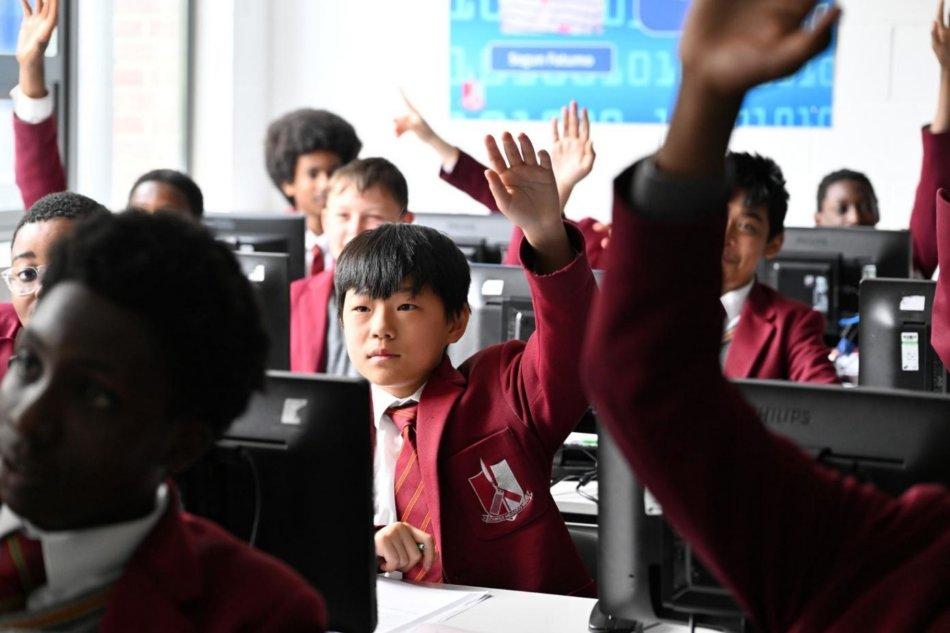
EXTRA CURRICULAR OPPORTUNITIES & OTHER INFORMATION
Coding Club
TOP TIPS TO ENHANCE LEARNING
Spaced Repetition Revision using flash cards and Carousel Learning (website)
Coding Practice using set problems on Microsoft Teams
Don’t give up when your code doesn’t work – this happens to every programmer, all the time!
WHAT COURSES DOES THIS LEAD TO?
KS4:
GCSE Computer Science
OCR Cambridge Nationals in IT
KS5:
A Level Computer Science
OCR Cambridge Techincals Level 3 in IT

French
WHAT WILL I LEARN?
Me, my family and friends
• Phonics and how to read in French
• Physical appearances
• Numbers and birthdays
• Family members School
• Subjects
• Teachers
• School day
• Classroom items and school facilities
Holidays and travel
• Countries
• Types of holidays
• Modes of transport
• Activities
• Past and future holidays
• Dram holidays Festivals
• Birthdays
• Weddings
• Christmas and New Year
• 14th July
• School trip
• Food
My world
• Friends and relationships
• Likes and dislikes
• Celebrity culture
• Extra-curricular activities
• Birthdays
• Clothes Future Plans
• Helping at home
• Jobs in the future
• Work experience
• University
• Family plans
Free-time
• Free-time activities
• Sports
• Weather
• Francophone sports/hobbies
Family and Relationship
• Family members
• Describing personalities
• Relationships with others
Free time
• Digital technology
• Sports and healthy living
• Mobile phones
• Film/Cinema
My town and region
• Describing types of accommodation
• Thinds to do in your region
• Future plans in your region
My town and area
• Types of home
• Types of regions
• Places in a town
• What you can/are going to do
Holidays
• Countries
• Types of holidays
• Modes of transport
• Activities
• Past and future holidays
School and work
• School day
• Daily routine
• The time
• Extra-curricular activities
Francophone culture
• Describing Francophone celebrities
• Francophone countries
• Francophone artists/ actors/sports stars
Media and technology
• Music
• Digital technology
• TV
• Social media
• Benefits and dangers
Lifestyle
• Sports
• Food
• Healthy lifestyle
• Unhealthy habits
Environment
• Weather
• Environmental problems
• Volunteering
• Saving the planet
Travel and holidays: francophone countries
• Countries
• Transport
• Activities
• Weather
• Past and future holiday plans
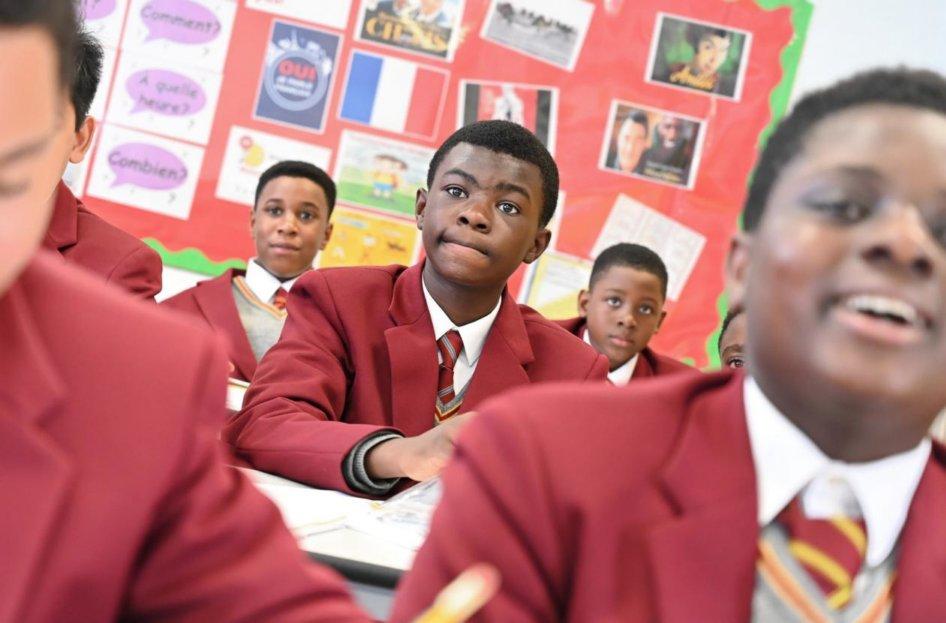
EXTRA CURRICULAR OPPORTUNITIES & OTHER INFORMATION
Homework is set on line and each student is given an individual login to https:// www.pearsonactivelearn.com/app/home for French and www.thisislanguage.com for Italian.
Every year a trip abroad is run for a week- this is alternated between France and Italy. all MFL students are eligible for this residential trip abroad to experience food, culture and of course the language!
TOP TIPS TO ENHANCE LEARNING
Students are given knowledge organisers and sentence builders per topic. They should be using this as part of their regular revision.
Active Learn
This is Language
Duolingo App
The Language Gym Online
Quizlet flashcards Online

WHAT COURSES DOES THIS LEAD TO?
7
MUSIC WHAT WILL I LEARN?
West African Drumming
• Playing Techniques
• Ensemble Performance
• Call & Response
• Improvisation
• Group Composition
• Context
Keyboard Lab
• Notes on Keyboard
• RH & LH Keyboard technique
• Performing famous melodies & basic LH harmony
• Stave notation – pitch/rhythm
Band Project
• Learn how to play instrument of choice: Drum kit, Bass guitar, vocals, electric guitar, bass guitar
• Study the music of the Reggae genre and perform 3 Little Birds
Latin Percussion
• Tuned percussion performing techniques
• Improvisation
• Melodic Structure
• Pentatonic Scale
• Introduction to Jazz
The Blues
• Historical context & significance
• Scales & Keys (Major & Blues)
• Triads & 7th chords
• 12 Bar Blues Chord Sequence
• Walking Bass
• Improvisation
• Hands together piano technique
• Ensemble performing
Minimalism
• Steve Reich clapping music minimalist techniques
• Composers – Steve Reich, The Orb, Michael Nyman
• Minimalist composition using Logic Pro X
Dance Music
• Using Logic
• 4-to-floor percussion rhythms
• Composing using major/ minor harmony
• Composing bass riffs
• Composing melodies over chord progressions
• Structuring a dance piece
• Standard conventions of dance music – bass drop, builds, looping, fade-outs
Afrobeat (fusion music)
• Learning what fusion music is and listening to some genres
• Learning about Fela Kuti and his influence on modern artists such as Burna Boy
(continuation of Latin percussion)
Introduction to the Orchestra / Logic Basics
• Instruments of Orchestra
• Famous composers –Beethoven & Mozart
• Study piece - Beethoven’s 9th Symphony
• Learning the basics on Logic Pro X
Baroque Remix
• Comparing arrangements in different styles
• Ground Bass composition/ arrangement
• Ensemble performance
Gaming and Film music
• Learning about sound effects and film / gaming music techniques
• History of gaming music
• Composing for gaming using logic, including hero theme

EXTRA CURRICULAR OPPORTUNITIES & OTHER INFORMATION
Auditions for STAC music scholars to take place in first week 25 successful students will have 1:1 lessons on their instrument (subsidised by the school) plus some special projects and concerts through the year
Our 40 strong Gospel choir is always open to new members and this has many concerts and a trip planned each year
Students learn a band instrument of their choice and can then go on to form their own bands and enter Battle of the Bands
TOP TIPS TO ENHANCE LEARNING
Spaced Repetition Revision using flash cards and Carousel Learning (website)
Wider listening based on topics being studied – e.g. watch YouTube clips of African Drumming
Regular short practice – e.g. 10 – 15 minutes per day more effective than 1 hour session per week
WHAT COURSES DOES THIS LEAD TO?
KS4:
EDEXCEL GCSE Music
RSL Level 3 Musical Performance
KS5:
EDUQAS A Level Music

PE
WHAT WILL I LEARN?
• Passing, dribbling, tackling, shooting, game awareness
Basketball
• Ball familiarisation, passing, dribbling, shooting, defensive principles.
Handball
• Ball familiarisation, passing, dribbling, shooting, game play
Swimming
• Front crawl, breast stroke, back stroke, butterfly
• Dribbling 1v1, Possession, overload, jokey and Tackle, 1 and 2 touch shooting.
Basketball
• Ball familiarisation and rules, Passing and receiving in the move, positioning in defence and attack, shooting driving and shooting
Handball
• Ball familiarisation with rules, passing and dribbling combined, attacking principles, defensive principles
Swimming
• Front crawl, breast stroke, back stroke, butterfly
Athletics
• Long distance, sprinting, jumps, throws
• Turns, possession practice, attacking principles, defensive principles, game play.
Basketball
• Passing tactics, screens & blocks, transitional play, shooting, game play.
Handball
• Basic skills, footwork, screens, crossover, full court transition
Swimming
• Front crawl, breast stroke, back stroke, butterfly
Badminton
• Serve, overhead clear, overhead smash, drop shot, forehand, backhand
Short Tennis
• Forehand, backhand, services, drop shot, combination play
Athletics
• Long distance, Sprinting, Jumps, Throws
Rugby
• Ball familiarisation, Tackling, Rucking, Passing, Game Play
Badminton
• Serve, overhead clear, overhead smash, drop shot, attacking principles, defensive principles
Short Tennis
• Forehand, backhand, services, drop shot, attacking principles, defensive principles
Athletics
• Long distance, Sprinting, Jumps, Throws
Rugby
• Ball familiarisation, Tackling, Rucking, Passing, Game Play
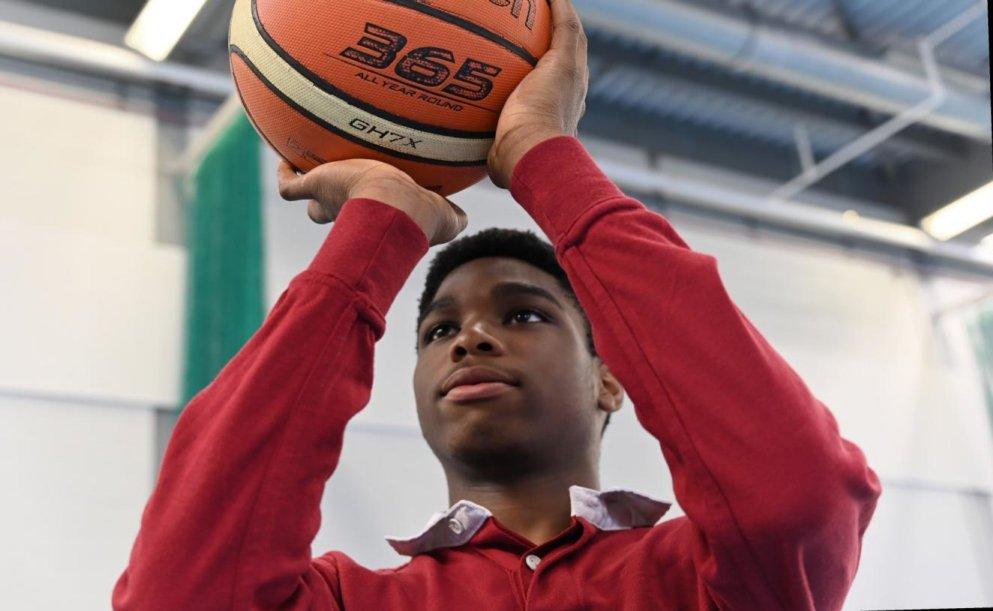
EXTRA CURRICULAR OPPORTUNITIES

TOP TIPS TO ENHANCE LEARNING
Design & Technology
WHAT WILL I LEARN?
Autumn/Spring/Summer
Unit 1 – Pop, let’s celebrate
Design & make principals
• Presentation and communication graphic skills
• Paper mechanisms and pop-up’s
• Paper and card modelling skills
• Measuring and marking accurately
• Quality control cutting skills
• Rendering and shading techniques
• CAD (Computer aided design skills)
• Core technical Knowledge
• 6 R’s (recycle, re-use, refuse, repair, reduce & rethink)
• Four types of motions
• Properties of paper, card and board
• Conversion of units in measurements (cm to mm)
Built on
• It has been assumed that students have learnt basic drawing, measuring and cutting skills during KS2.
Unit 1 – Electronic gadget holders
Design & make principals
• CAD (Tech-soft 2D design skills)
• CAM (Laser cutting and engraving)
• Surface finishing techniques
• Product analysis techniques
Core technical Knowledge
• Polymers - Thermo and Thermosets
• 20th Century design movements
• 3D Structures
• Iconic designers
• Flat packed products
Built on
• Pop, let's celebrate - Graphic communication skills
• Monster cable wraps - Technical woodwork manufacturing skills
Unit 2 – Monster cable wraps
Design & make principals
• Biomimicry using cells in nature to inspire ideas
• Iterative design techniques
• Principals of packaging
• CAM (Laser cutting)
• Technical woodwork manufacturing skills
Core technical Knowledge
• Modern technologies
• Robotics and automation
• Timber and manufactured boards
• Vacuum forming
• Packaging symbols
Built on
• Pop, let's celebrate - Graphic communication skills
Unit 2 – Mechanical toys
Design & make principals
• Orthographic perspective
• Scaled technical drawing
• Wood surface finishing techniques
• Screw and dowel joints
Core technical Knowledge
• Mechanical components
• Mechanisms, forces and motions
• Natural timber compared with manufactured boards
Built on
• Monster cable wraps - Technical woodwork manufacturing skills
• Electronic gadget holders – CAD, CAM and finishing techniques

EXTRA CURRICULAR OPPORTUNITIES & OTHER INFORMATION
Design clubs
Workshops
Design Museum
Design competitions with real life design briefs
TOP TIPS TO ENHANCE LEARNING
Technology Student an excellent website to enhance the student’s knowledge in materials, manufacturing processes and equipment.
BBCBYTESIZE an excellent website to assess student’s knowledge and skills.
Practice and experiment with a range of design techniques tools and materials, outside of the classroom.
WHAT COURSES DOES THIS LEAD TO?
KS4:
GCSE Design and Technology
KS5:
A Level 3D Design

Design & Technology
WHAT WILL I LEARN?
Unit 1 – Personal pendants
Design & make principals
• Isometric drawing
• Pewter casting
• Metal surface finishing
• Hand engraving skills
• Design development
Core technical Knowledge
• Ferrous and non-ferrous metals
• Metal Alloys
• Casting moulds and forming
Built on
Autumn/Spring/Summer
Unit 2 – Mood lights
Design & make principals
• Wood joining technigues
• Solder components
• Transparent designs
• User-centred design techniques
Core technical Knowledge
• Electronic components
• Circuit symbols
• Material properties
• Smart and composite materials
• Ergonomics & anthropometrics
• Electronic gadget holders – CAD, CAM and finishing techniques
• Mechanical toys – Technical wood manufacturing skills
Built on
• Mechanical toys – Technical wood manufacturing skills
• Personal pendants – Casting and forming techniques

EXTRA CURRICULAR OPPORTUNITIES & OTHER INFORMATION
Design clubs
Workshops
Design Museum
Design competitions with real life design briefs
TOP TIPS TO ENHANCE LEARNING
Technology Student an excellent website to enhance the student’s knowledge in materials, manufacturing processes and equipment.
BBCBYTESIZE an excellent website to assess student’s knowledge and skills.
Practice and experiment with a range of design techniques tools and materials, outside of the classroom.
WHAT COURSES DOES THIS LEAD TO?
KS4:
GCSE Design and Technology
KS5:
A Level 3D Design

Life Skills
SUMMARY
There will be various drop down periods throughout the year for students to learn about some key Life Skills. These lessons will enrich students in subject areas not taught through other curriculum areas. Students receive lessons on First Aid, Financial Literacy, Civics, and Oracy - equipping them to better navigate the world, confidently communicate and make effective decisions.
WHAT WILL I LEARN?
Civics
Civics will encourage students to be informed and active members of their communities so they are aware of their place in our democracy and understand how democracy in the UK works They will learn about the basics of parliament, different ideologies , the main parties and many more crucial topics. We hope this will help mould our students into active members of the community and the political system
Financial Literacy
Students will learn that Financial literacy is the ability to understand and effectively use various financial skills, including personal financial management, budgeting and investing Financial literacy is the foundation of students relationship with money, and they are taught about it in context of their lifelong journey of learning The earlier they start, the better off they will be, because education is the key to success when it comes to money
Public Speaking
Students will follow a programme of study where they have to identify a local social issue they are keen to explore, research it, plan and present it as part of a group to the rest of the class Our aim to develop the students’ presentation skills and public speaking.
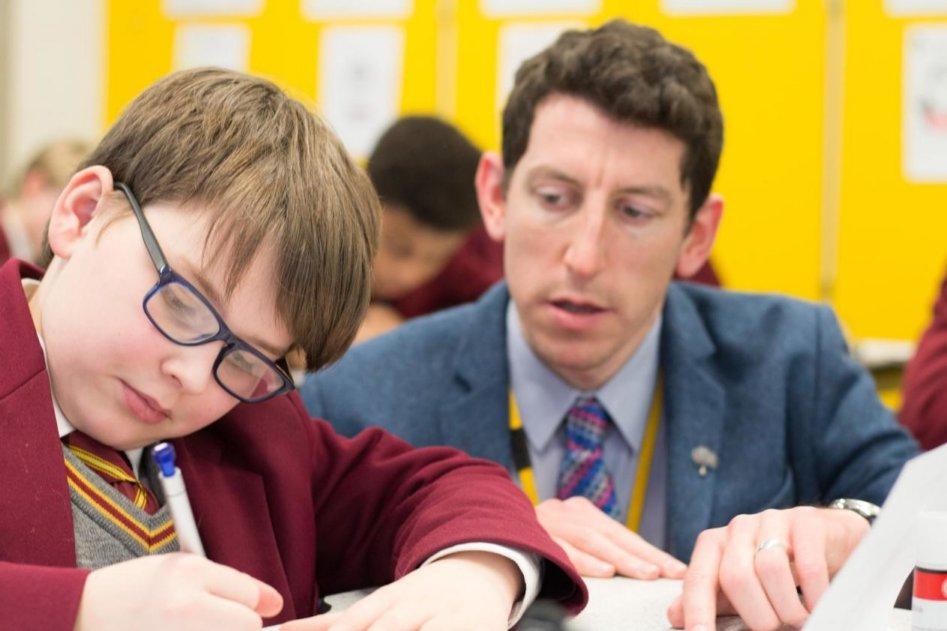
EXTRA CURRICULAR OPPORTUNITIES & OTHER INFORMATION
Student Council
TOP TIPS TO ENHANCE LEARNING
Use of Knowledge Organiser
https://www.bbc.co.uk/tv/bbcparliament
https://www.parliament.uk/
WHAT COURSES DOES THIS LEAD TO?
KS4:
History
KS5:
Government and politics
Sociology


